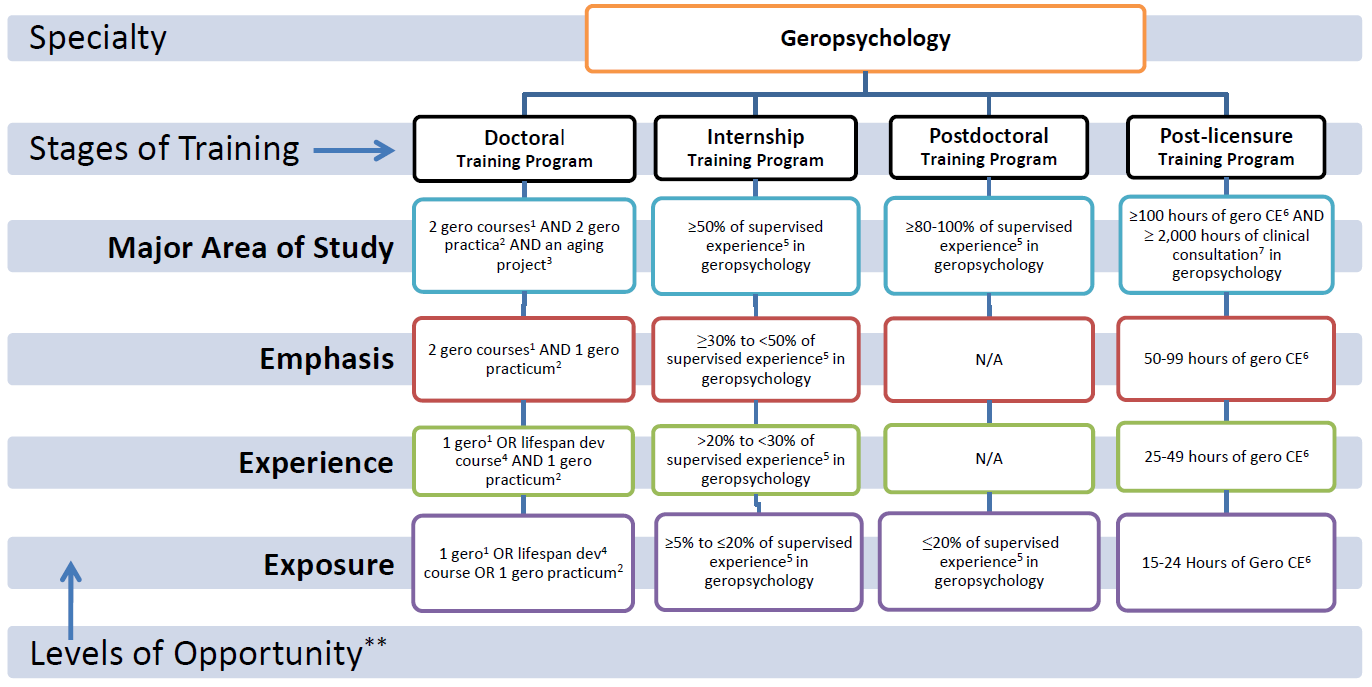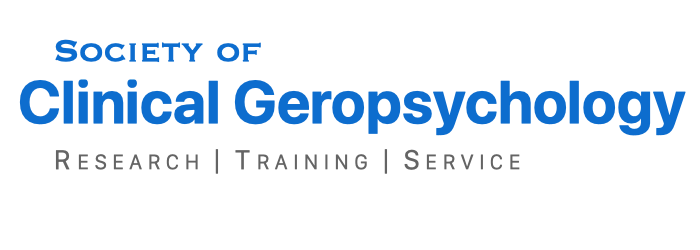
Career & Training in Aging
APA Careers in Aging Roadmap outlines step-by-step educational roadmap to help undergraduate and graduate students find careers in aging. It includes specific questions to consider at each educational level, actions to take to be prepared and positioned to embark on a career in aging, resources (directories of programs in psychology and gerontology, academic resources, preparing for graduate school, networking, and how to prepare for a job search), career profiles, and interdisciplinary careers that intersect with aging including those in engineering, business, law and policy, and biological and health sciences.
The Path to Becoming a Geropsychologist from Ask the Experts Survey (2020) compiles words of wisdom and other helpful insights to succeed in the field of gerospychology. Check it out!
GeroCentral offers training activities for students looking for more geropsychology training in research and practice.
Council of Professional Geropsychology Training Programs (CoPGTP) includes Pikes Peak Model for training and lists geropsychology-focused internships and post-doctoral fellowship training programs.
Pikes Peak Reading/Resource List Google Drive (click here to access on VA equipment)
Email cogptpsec@gmail.com for questions about the Reading List
Download Geropsychology Specialty Taxonomy Grid (below)

**The term “focus” should be used to describe opportunities in areas of training which are not recognized specialties. Training programs should strive to provide explicit explanations of the type of training provided in these non-specialty areas.
Geropsychology E & T Taxonomy was approved by CoS Board of Directors on 10- 24-2021. CoS will request an updated Taxonomy for CoS review and approval one year prior to Geropsychology’s next petition for renewal of specialty recognition by the Commission for Recognition of Specialties and Subspecialties in Professional Psychology (CRSSPP). The updated Taxonomy will be due at end of 2022.
Common Definitions and Criteria Across All Recognized Specialties
- Broad and general training forms the core of education and training in health service psychology. Programs are accredited by the American Psychological Association or Canadian Psychological Association. Programs integrate the broad and general training with those educational and training activities related to recognized specialties as determined by the specialty and described in a specialty taxonomy. In addition, each specialty will have education and training guidelines consistent with its specialty area. Specialty training may be acquired at the doctoral, doctoral internship, postdoctoral, or postlicensure stages as defined by the specialty.
- By definition, postdoctoral education and training is a Major Area of Study in a specialty recognized by the Commission for the Recognition of Specialties and Subspecialties in Professional Psychology (CRSSPP) and requires that 80% or more of time be spent in the specialty area. At the postdoctoral training stage, as per above, it is recognized that training in the Major Area of Study will be consistent with the education and training guidelines set forth by the specialty.
- A course is typically defined as 3 semester-credit hours (or equivalent) in a health service psychology training program accredited by the American Psychological Association (APA) or the Canadian Psychological Association (CPA).
- A practicum is typically defined as the equivalent of one academic year (e.g., 9 months, in semester or quarter systems) consisting of supervised training for at least 8 hours per week, or its equivalent, with at least 50% of time in the provision of clinical services.
- Consistent with what is described in CoA Standards of Accreditation, supervision should be provided by persons with competencies in the specialty demonstrated by appropriate training, credentials, and qualifications for training in the specialty as defined by the specialty.
- Additional training experiences can also include, but are not limited to, research experiences, lab meetings, brown bags, lecture/colloquia series, and grand rounds, as defined by the specialty.
- For definitions of continuing education (CE) and continuing professional development (CPD) see the APA Quality Professional Development and Continuing Education Resolution. A continuing education (CE) course is defined as an organized program by the American Psychological Association or Canadian Psychological Association, a State Psychological Association, or other major provider of CE (e.g., Society of Behavioral Medicine).
Specialty Specific Definitions and Criteria
1Geropsychology Course = Must have content congruent with APA Guidelines for Psychological Practice with Older Adults and the Pikes Peak Model for Geropsychology Training (cogptp.org). While courses are typically 3 credit hours, a course series (e.g., an advanced clinical seminar encompassing 1 credit hour for each of four semesters) would serve as equivalent. In addition, doctoral programs with Major Area of Study or Emphasis in geropsychology are strongly encouraged to infuse geropsychology & aging content across all courses when possible (e.g., research methods courses may include content on: recruitment of populations of older adults underrepresented in clinical studies, advantages and disadvantages of longitudinal vs cohort designs, assessing research consent capacity, methods of quality improvement).
2Clinical Geropsychology Practicum = Must have at least 50% clinical contact with older adults, family members, and their interprofessional teams, or geropsychology-relevant clinical issues (e.g., grief, chronic pain).
3Aging Project = Empirical research, extended case studies, lit critiques & analyses, or capstone projects that programs require. Programs should have at least one faculty member whose research or clinical interests are in geropsychology and/or aging, and students entering this program would have the opportunity to be mentored by this faculty member on this Aging project.
4Lifespan Development = Lifespan Development course wherein at least 50% of the course focuses on Adult Development and Aging
5Supervised Experience = Must include at least 50% clinical contact with older adults, their family members, and their interprofessional teams and clinical service provision (e.g., assessment, treatment, consultation). If offered, seminar attendance, interdisciplinary team participation, readings, and research may count as part of the supervised experience for interns & postdoctoral fellows. Whenever possible, primary supervisors are strongly encouraged to have training, qualifications, or credentials (i.e., ABGERO). To support growth of the geropsychology workforce, additional supervisors in older adult-focused clinical settings may also include (and are not limited to) geriatric neuropsychologists, health psychologists, and rehabilitation psychologists.
6CE Coursework – Must be approved by APA or by another major mental health or medical organization (e.g., CME, post-graduate certificate in Gerontology) (See also: Hoge, M. A., Karel, M. J., Zeiss, A. M., Alegria, M., & Moye, J. (2015). Strengthening psychology’s workforce for older adults: Implications of the Institute of Medicine’s report to Congress. The American psychologist, 70(3), 265–278. https://doi.org/10.1037/a0038927)
7Clinical Consultation = Weekly consultation by a geropsychologist or equivalent (i.e., geriatrician, geriatric psychiatrist, geriatric neuropsychologist) that includes de-identified case discussion of active clinical work with older adults (e.g., a small group discussion with real-time feedback from the geropsychologist). The 2,000 required hours completed through weekly consultation meetings would generally be achieved in 12 months.
Examples of Program Descriptors for Each Stage of Training
Doctoral
The clinical science program offers a Major Area of Study in clinical geropsychology that provides research training in the science of clinical psychology and aging along with sound clinical training in work with older adults. Both research and clinical training experiences emphasize interdisciplinary work and cooperation with colleagues from related research fields and professions. USC is one of the first clinical geropsychology programs in the country. Faculty and graduates are among the leaders in the field. Clinical geropsychology students take coursework in adult development and aging to become familiar with normal aging (cognitive changes, biomedical aspects, and social context and policy) and with developmental research methodology. For clinical geropsychology students, approximately half of the practicum work in assessment and psychotherapy required by the clinical science program involves older adult clients, primarily seen through the Older Adult Counseling Center located in the Psychology Services Center. The Older Adult Counseling Center affords experience in therapy with individuals and families and with assessment of cognitive disorders. (From the Dept of Psychology, University of Southern California)
Doctoral internship
The internship offers a Major Area of Study in clinical geropsychology. Typically, doctoral interns are involved in diverse clinical services including in-home, in clinic, in the field, and telehealth psychotherapy with older adults, psychotherapy with severely mentally ill elders, clinical case management, limited psychological assessment, clinical mental health outreach with elders experiencing severe symptoms of mental illness, consultation with multidisciplinary professionals and psychoeducational outreach. Many services are delivered where elders live, including with homeless older adults, as well as services being provided in the office and via telehealth. Each week interns receive two hours of individual supervision, one hour of clinical staff consultation and one geropsychology training seminar. Full-time interns receive two additional hours of group supervision/week. (Adapted from the internship at Heritage Clinic, a Division of the Center for Aging Resources)
Postdoctoral residency
The Postdoctoral Fellowship with Geropsychology as the Major Area of Study offers placements in settings where mental health services are provided to older adults with a range of psychiatric difficulties, including psychotic, affective, anxiety, adjustment and personality disorders, as well as Alzheimer’s disease and related dementing conditions. The fellowship is accredited by the American Psychological Association and is a member of the Council of Professional Geropsychology Training Programs (CoPGTP), The goals and objectives of the fellowship are based on the recommendations from the Pikes Peak model for training in professional Geropsychology (Knight, Karel, Hinrichsen, Qualls, & Duffy, 2009). The fellow is expected to devote 32-40 hours per week (80% time) to clinical service delivery (in the form of direct patient contact, documentation and related service such as consultation with colleagues) and 8-10 hours per week (20% time) in educational activities in the form of didactics, receiving supervision, and supervision of other trainees. The Fellowship includes a didactic program of seminars and case conferences. (Adapted from the fellowship brochure at Long Island Jewish Medical Center – Zucker Hillside Hospital)
Post-licensure training
Our geriatric mental health training institute is approved by the American Psychological Association to provide regular continuing education courses and trainings, permitting participants to gain Exposure to geropsychology over time.
